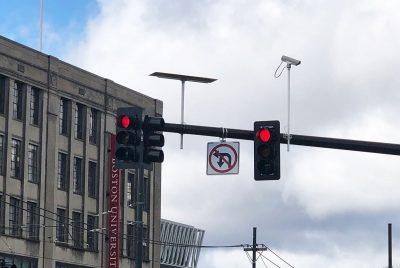The Massachusetts Senate took up an automated enforcement bill Thursday to install cameras at red lights to photograph the license plates of cars breaking traffic laws. A vote was initially expected on the same day, but the Senate decided to delay the decision.

The cameras would automatically ticket drivers making illegal right turns, driving in bus lanes and blocking intersections. It would also fine vehicles running red lights, speeding or passing a school bus with its stop sign up and lights on.
All photographs taken would be deleted 48 hours after a ticket is disposed, and $25 would be the maximum fine for violations caught on camera. The cameras would also avoid taking snapshots capable of identifying drivers within vehicles, according to legislators.
Sen. Will Brownsberger, who filed the original bill, said in an interview there would likely be a two-week delay on action for the bill while discussions go on surrounding amendments, privacy concerns and the locational range of the camera installations.
“I think the main issues were around the scope of the rollout, which communities would be affected and whether there would be a sunset,” Brownsberger said. “Things that are related to, how far would we go before pulling back the leash or would we let some communities go forward without a sunset date.”
As the bill stands now, one camera would be placed for approximately 2,500 people in the Commonwealth. Much of the concern both in the legislature revolved around fears that the cameras would be too widely used, Brownsberger said.
Similar bills for red-light cameras have been implemented in several states across the United States with mixed results. According to the U.S. Centers for Disease Control, studies on the effectiveness of these cameras have varied, and different conclusions have been drawn from different studies.
Red light camera bills have faced controversy in the past. Common concerns include potential increases in rear-end accidents and corruption in enforcement.
The Chicago Tribune reported that after Chicago implemented red light cameras in 2007, right-angle crashes declined by 15 percent, but rear-end collisions rose by 22 percent.
Texas also banned red-light cameras in 2019, joining seven other states in prohibiting the technology.
Brownsberger said red-light cameras in other states have often fallen to profit motive, and thus have been overly extractive of the population.
“This bill prohibits municipalities from making money on cameras,” Brownsberger said, “and actually also prohibits any compensation arrangement for the vendors that would be based on the volume of tickets written.”
Brownsberger also said use of cameras is already prevalent in public settings for various purposes.
“There are cameras all over the place, sadly, and that camel is already in the tent,” Brownsberger said. “I think we should have legislation to regulate police use of cameras and use of cameras by others. And legislation on that issue is pending.”
Brownsberger said that he understands the privacy concerns surrounding cameras, but that provisions in the bill should limit those concerns.
“They’re in locations that are publicly approved. There’s signage, unlike many of the other cameras… and they can only take a picture when there is a violation,” Brownsberger said. “They’re not soaking up a lot of data, there’s just not a lot of data to be [captured].”
Brownsberger’s proposal is part of a larger platform of bills aimed at increasing road safety and eliminating deaths on Massachusetts highways. Legislation the senator worked on included the hands-free driving bill that recently became a new law.
Louisa Gag, public policy director for LivableStreets Alliance, said it is important to fundamentally change the way streets are designed in Massachusetts to ensure the safest conditions possible.
“Speeding is one of the most significant factors in fatalities and serious injuries from traffic,” Gag said. “It’s important to and try and reduce [injuries] by primarily changing the way streets work, so that drivers are either forced to go slower, or coerced to go slower by visual cues or narrowing lanes.”
Gag also said that the bill would promote racial equity by replacing human police enforcement with automation.
“If you are implementing cameras in a purposeful and equitable way,” Gag said, “then you get to remove this aspect of bias on the part of the police officer.”
Gail Korn, 79, of Back Bay said she thinks the new law would be great for pedestrian safety.
“There’s too many people on their phones crossing the street and not looking, too many people in their cars,” Korn said. “With the new law, hopefully they’re not going to be texting. But it just doesn’t hurt to keep them in control.”
Dennis Carrafiello, 49, of Waltham said the installation of new cameras won’t change much, as he feels they’re “everywhere” nowadays anyway.
“I guess it’s not an invasion of your privacy if you’re breaking the law,” Carrafiello said. “But at the same time, where does it end?”
Phillip Baker, 30, of Jamaica Plain said he finds it plausible the cameras might engender increased risk of traffic accidents from drivers making abrupt stops to avoid speeding past red lights.
“There are some streets where people seem to drive pretty fast,” Baker said. “I actually think just adding more speed bumps could help with that.”





















































































































